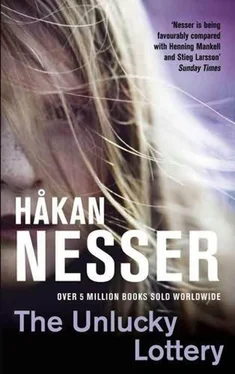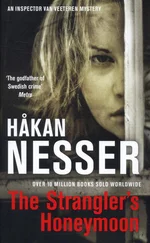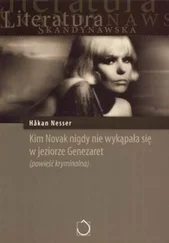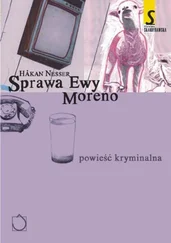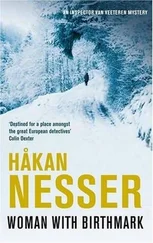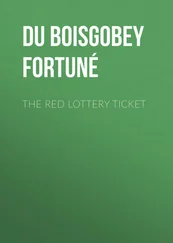‘What the hell do you mean?’ said Reinhart.
‘Don’t bother trying to comprehend what you don’t understand anyway,’ said Van Veeteren. ‘Tell me the situation instead!’
‘We’re nearly there,’ said Reinhart.
‘There?’
‘Listen carefully, my dear ex-chief inspector,’ said Reinhart. ‘Münster is up north, and things are going according to plan, if not better. I spoke to him on the phone half an hour ago, and he’d unearthed evidence that points clearly in a certain direction.’
‘Go on,’ said Van Veeteren.
Reinhart sighed and explained patiently what had happened for another two or three minutes until Van Veeteren interrupted him.
‘All right, that’s enough,’ he said. ‘We’ll drive there. You can tell me the rest in the car.’
‘Drive there? What the hell…?’ exclaimed Reinhart, but as he did so a warning light started blinking somewhere at the back of his mind. He thought for a moment. If there was a rule he had discovered that was worth following during the chief inspector’s time – just one single rule – it was this one.
Never ask questions when Van Veeteren makes a sudden and apparently incomprehensible decision.
Reinhart had done that a few times. At first. Queried the decision. He had always been proved wrong.
‘You can pick me up outside Adenaar’s five minutes from now,’ said Van Veeteren. ‘No, four minutes. Are you with me?’
‘Yes.’ Reinhart sighed. ‘I’m with you.’
When Münster had finished his dinner at a Chinese restaurant, he sensed once again how tired he was. He drank his usual two cups of strong black coffee as an antidote, and wondered how many years it would be before he had stomach ulcers. Five? Two?
Then he settled up, and tried to concentrate on work again.
On the case. The last act was looming now. About time too: he made a mental note to the effect that he would go to Hiller and demand a week off as soon as it was all over. Or on Monday. Two weeks, come to that.
Then he phoned Maardam from the car, to put them in the picture. He spent ten minutes relating the latest developments to Heinemann, the only person available. Heinemann concluded by urging him to be extremely careful, in his usual long-winded style.
When he had finished with Heinemann, Münster informed the local police authorities. Spoke to Inspector Malinowski, who had some difficulty in catching on at first: but he eventually seemed to have grasped the situation. He promised that everything would be on stand-by by the time he heard again from Intendent Müssner.
‘Münster,’ said Münster. ‘Not Müssner.’
‘Okay,’ said Malinowski. ‘I’ve made a note.’
He started the engine and set off. It was almost six o’clock, and darkness was beginning to settle over the deserted town. A strong wind had blown up again, but there still hadn’t been a drop of rain this long Thursday.
He parked a few minutes later. Remained seated for a while, composing himself. Then he checked he had both his gun and his mobile with him, and got out of the car.
‘There’s a film by Tarkovsky,’ said Van Veeteren. ‘His last one. The Sacrifice . That is what this is all about.’
Reinhart nodded. Then he shook his head.
‘Enlighten me,’ he said. ‘I’ve seen it, but it was several years ago.’
‘You should see Tarkovsky’s films several times, if you have the opportunity,’ said Van Veeteren. ‘There are so many layers of meaning. You don’t remember this one?’
‘Not off the top of my head.’
‘He poses a fundamental question in that film. We could put it like this: if you meet God in a dream and make him a promise, what do you do when you wake up?’
Reinhart put his pipe into his mouth.
‘I do recall that,’ he said. ‘He’s going to sacrifice his son in order to make the reality that is threatening everybody merely an illusion, isn’t that right? A world war becomes only a nightmare if he carries out that deed.’
‘Something like that,’ said Van Veeteren. ‘The question, of course, is whether we really do receive signs like that. And what happens if we ignore them. Break the agreement.’
Reinhart sat in silence for a while.
‘I never stood on the lid of a well during the whole of my childhood,’ he said.
‘That’s presumably why you’re still alive,’ said Van Veeteren. ‘How long to go?’
‘An hour,’ said Reinhart. ‘I have to say I’m still not at all sure what the devil Tarkovsky has to do with this trip. But I suspect you’re not going to tell me?’
‘You suspect correctly,’ said Van Veeteren, lighting a newly rolled cigarette. ‘That’s also part of the agreement.’
The taxi driver’s name was Paul Holt. It was Krause who had tracked him down, and Moreno met him in his yellow cab outside the Hotel Kraus. A slim man in his thirties. White shirt, tie and a neat pony-tail. Moreno sat down in the front passenger seat, and when he shook her hand and introduced himself she discerned a distinct smell of marijuana in his breath.
Ah well, she thought. He’s not going to be driving me anywhere.
‘It’s about that fare of yours a few months ago,’ she said. ‘Fru Leverkuhn in Kolderweg. How well do you remember it?’
‘Quite well,’ said Holt.
‘It wasn’t exactly yesterday,’ said Moreno.
‘No,’ said Holt.
‘You must have had hundreds of fares since then, surely?’
‘Thousands,’ said Holt. ‘But you remember the special ones. I can tell you in detail about an old man in spotted trousers I drove eight years ago, if you want me to. In detail.’
‘I understand,’ said Moreno. ‘And that trip with fru Leverkuhn – that was special, was it?’
Holt nodded.
‘In what way?’
Holt adjusted his hair ribbon and clasped his hands over the steering wheel.
‘You know that as well as I do,’ he said. ‘I mean, there were articles in all the newspapers about them. Mind you, I’d have remembered that trip in any case.’
‘Really?’
‘It was a bit unusual, and that’s the kind of thing you remember.’
‘So I gather,’ said Moreno. ‘Can you tell me where you drove to, and what she did?’
Holt wound down the side window a decimetre and lit an ordinary cigarette.
‘Well, it was more of a goods delivery than anything else. Both the back seat and the boot were full of suitcases and bags. I think I pointed out to her that there were delivery firms for jobs like that, but I’m not sure. I took it on, anyway. You do what you have to do.’
‘Where did you go?’
‘First to the charity shop in Windemeer,’ said Holt. ‘Dropped off quite a few of the bags. I waited outside while she sorted things out in the shop. Then we continued to the Central Station.’
‘The railway station?’
‘Yes, the Central Station. We carried in the rest of the stuff, I think there was a suitcase and two other bags – those big, soft-sided bags, you know the kind of thing. Yes, there were three of them. Heavy they were, as well. She locked them away in left-luggage lockers, and then we drove back to Kolderweg. She got out at the shopping centre. It was pissing down.’
Moreno thought for a while.
‘You have a good memory for details,’ she said.
He nodded, and drew on his cigarette.
‘I suppose so,’ he said. ‘But as I said, it’s not the first time I’ve thought about that trip. Once you’ve recalled something, it’s there. Sort of like a photo album. Don’t you find that as well?’
Yes, Ewa Moreno thought, after she had left the yellow taxi. He was right about that, surely? Surely there were things you never forgot, no matter how much you wished you could? That early morning four years ago, for instance, when she and Jung broke into a flat in Rozerplejn, and found a twenty-four-year-old immigrant woman with two small children in a large pool of blood on the kitchen floor. The letter informing her that she would be deported was lying on the table. She recalled that all right…
Читать дальше
